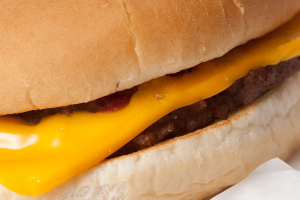 By now, I think we all know that fast food is incredibly unhealthy, and eating it on a regular basis is a surefire way to wreck your body and mind. The purveyors of these foods (if you can call what they serve “food”), are now viewed with as much disdain as the tobacco companies, and the sales for companies like McDonald’s have been declining across the board for the better part of a year. So not only are we all aware of the health consequences of this food, but many of us are starting walk the walk.
By now, I think we all know that fast food is incredibly unhealthy, and eating it on a regular basis is a surefire way to wreck your body and mind. The purveyors of these foods (if you can call what they serve “food”), are now viewed with as much disdain as the tobacco companies, and the sales for companies like McDonald’s have been declining across the board for the better part of a year. So not only are we all aware of the health consequences of this food, but many of us are starting walk the walk.
However, not everyone agrees on why these foods are so bad for us. Some say it’s the sugar, some say it’s the fat, while others believe it’s due to the processed nature of these products. Maybe it’s some combination of all three. What’s more important though, is how these ingredients can wreak so much havoc on our bodily functions.
One British professor by the name of Tim Spector may have discovered one of the ways these foods are killing us. He decided to conduct an experiment with his college aged son, who was given a steady stream of McDonald’s for 10 days. The goal was too see what effect fast food might have on the bacteria of our digestive system.
He was only allowed to eat Big Macs, chicken nuggets, fries, and soda for every meal, as well the occasional serving of chips or beer. Before, during, and after the experiment, fecal samples were collected and sent to a laboratory. The results were startling to say the least.
Tom started in high spirits and many of his fellow students were jealous of his unlimited junk food budget. As he put it:
“I felt good for three days, then slowly went downhill, I became more lethargic, and by a week my friends thought I had gone a strange grey colour. The last few days were a real struggle. I felt really unwell, but definitely had no addictive withdrawal symptoms and when I finally finished, I rushed (uncharacteristically) to the shops to get some salad and fruit.”
While it was clear the intensive diet had made him feel temporarily unwell, we had to wait a few months for the results to arrive back. The results came from Cornell University in the US and the crowdfunded British Gut Project, which allows people to get their microbiome tested with the results shared on the web for anyone to analyze. They all told the same story: Tom’s community of gut microbes (called a microbiome) had been devastated.
Tom’s gut had seen massive shifts in his common microbe groups for reasons that are still unclear. Firmicutes were replaced with Bacteroidetes as the dominant type, while friendly bifidobacteria that suppress inflammation halved. However the clearest marker of an unhealthy gut is losing species diversity and after just a few days Tom had lost an estimated 1,400 species – nearly 40% of his total. The changes persisted and even two weeks after the diet his microbes had not recovered. Loss of diversity is a universal signal of ill health in the guts of obese and diabetic people and triggers a range of immunity problems in lab mice.
Isn’t that horrifying? These are the organisms that are responsible for our ability to digest carbohydrates, absorb nutrients, prevent allergies, lower inflammation, among many other functions. They may even have a significant effect on our mental faculties. And yet, so many people are still willing to eat this garbage. It’s no wonder we have numerous health problems.
So if you’re in the process of improving your diet, make sure you eat plenty of probiotics such as yogurt, sauerkraut, kombucha, or just about anything that is fermented (no, not beer). Our Western diets are ruining one of the most important parts of the human body, and it’s up to us to repair that damaged biome if we want to live long, healthy lives.
